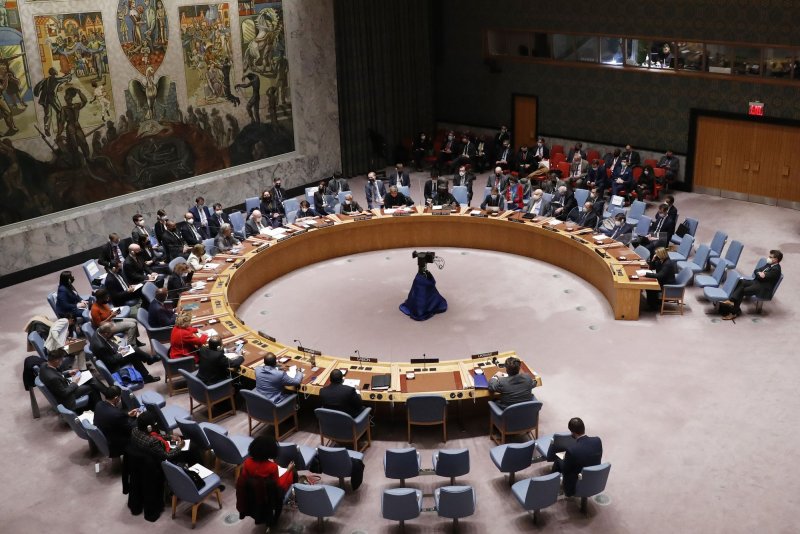1 of 2 | Russia and China vetoed a U.S.-led resolution in the U.N. Security Council that sought to place additional sanctions on North Korea in the wake of its ballistic missile tests. File Photo by John Angelillo/UPI |
License Photo
SEOUL, May 27 (UPI) -- China and Russia shut down a U.S.-led U.N. Security Council resolution to impose additional sanctions on North Korea over its ballistic missile launches, highlighting a widening geopolitical divide that Washington's envoy warned would "embolden" the nuclear-armed regime.
The vote was held on Thursday, a day after North Korea launched three ballistic missiles, including one that South Korea's military said was likely an ICBM, in its latest round of weapons tests
The 15-member Security Council voted 13-2 in favor of the sanctions, which aimed to ban tobacco and reduce oil exports to North Korea as well as freeze the assets of the Lazarus Group hackers.
However, Russia and China -- which wield veto power as permanent members -- blocked the resolution from passing, marking the first time the Security Council has been split on the issue since sanctions against North Korea began in 2006.
"I am beyond disappointed that the council has not been able to unify in opposition to the DPRK's unlawful WMD and ballistic missile programs," U.S. Ambassador to the United Nations Linda Thomas-Greenfield said after the vote. "And that failure rests on China and Russia alone."
The Democratic People's Republic of Korea is the official name of North Korea.
"The failure to adopt a new resolution undermines the Security Council's previous actions to which they've agreed unanimously, and will only embolden the DPRK to conduct further provocations," Thomas-Greenfield said, reading from a joint statement on behalf of the United States, Japan and South Korea.
North Korea has conducted 17 rounds of weapons tests this year, firing almost two dozen ballistic missiles, which it is prohibited from doing under existing Security Council resolutions. Pyongyang also lifted its self-imposed moratorium on long-distance missile launches and began conducting ICBM tests in March for the first time since 2017.
Ahead of the vote, Thomas-Greenfield said North Korea is "actively preparing to conduct a nuclear test."
South Korea also expressed "deep regret" over the vetoes by China and Russia.
"Despite the overwhelming support by 13 members of the 15-member Security Council, this resolution was not passed as two permanent members vetoed it," ministry spokesman Choi Young-sam said.
"The failure to adopt the resolution greatly undermines the international community's confidence in the Security Council."
The vote came as Russia has grown increasingly isolated on the global stage over its invasion of Ukraine, with China seen as offering tacit support while harboring its own ambitions of seizing Taiwan. Moscow and Beijing had signaled their opposition to the resolution in advance of the vote, instead urging Washington to issue a presidential statement.
On Thursday, Russian Ambassador to the United Nations Vassily Nebenzia called any new sanctions on North Korea a "dead-end road" and a "wrong, ineffective and inhumane thing to do."
China's envoy, meanwhile, said that the sanctions would "only lead to more negative effects and escalation of confrontation."
"Additional sanctions will also have a greater humanitarian impact, especially against the backdrop of emerging COVID-19 in the DPRK," Ambassador Zhang Jun said.
He also accused Washington of using the North Korea issue as "a chessman on the chessboard for their so-called Indo-Pacific strategy."
U.S. President Joe Biden wrapped up a five-day trip to South Korea and Japan on Tuesday in which he unveiled new economic and security partnerships with the aim of countering China's rising power and assertiveness in the region.
China and Russia conducted a joint warplane exercise over the Sea of Japan while Biden was in Tokyo, a provocative move that raised concerns the two countries are deepening ties in the face of international opposition to the Ukraine invasion.















